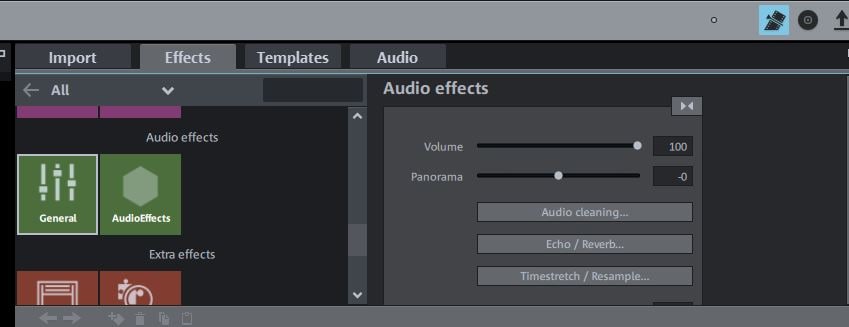
2024 Approved The Ultimate Step-by-Step on Incorporating Sound Into Videos Using Magix

The Ultimate Step-by-Step on Incorporating Sound Into Videos Using Magix
How to add Audio to Video in Magix Movie Edit Pro

Shanoon Cox
Mar 27, 2024• Proven solutions
Having a perfect soundtrack to your videos is as important as having a perfectly captured footage, because the music and sounds you add to your videos, set the atmosphere of the video. Choosing the right music and atmospheric sounds to match the action taking place in the video is an important task that shouldn’t be taken lightly since the video’s reception by the audience depends on it. Failing to lip-sync or to add a knocking sound when someone is entering the room will reduce the realism of your film and break the illusion you tried so hard to create.
Let’s have a look at how you can add and remove audio files to video using Magix Movie Edit Pro video editing software.
How to add audio to video in Magix Movie Edit Pro
Before deciding to remove the audio file that was recorded together with the video clip, make sure that you already have sounds and music that will replace it. Having the audio recordings that match your video perfectly is of utmost importance because if you add files that don’t match the video the final result will be barely watchable.
1.Import the video clip and separate the video and audio
All video clips also contain an audio file, that isn’t displayed on the Magix Movie Edit Pro’s timeline until the two files are separated. In order to separate the audio and video file, you need to select the video file you placed on the timeline, by dragging it from the ‘Import’ tab and dropping it on the video track and then click on the ‘Ungroup’ icon on the editor’s timeline.
2.Remove and replace the files on the audio track
After clicking on the ‘Ungroup’ icon, you will be able to see an audio file on the editor’s audio track. If you would like to remove it from the project entirely, select the audio file and click on the ‘Delete’ button on your keyboard. However, if you would like to keep parts of the original audio track, select the file, place the playhead at the position in the file where you would like to make the cut and then click on the ‘Split objects’ icon on the toolbar. Repeat the same action at the position where you would like the sound file to end.
Adding new audio files to your project is simple, because all you need to do is head over to the ‘Import’ tab, locate the files you want to use in your video on your hard-drive and drag and drop them onto the audio track. Cut out the parts of the audio file you don’t want to use by clicking on the ‘’Split objects’ icon and make sure that the length of the audio matches the length of the video.
3.Edit the audio files
Magix Movie Edit Pro offers a large number of audio effects that can help you create a better soundtrack for your video. Click on the ‘Effects’ tab and slide down to the ‘Audio Effects’ section where you can adjust the volume, clean the background noises in the audio or apply some of many audio effects located under the ‘Audio Effects’ option. Additional audio effects can be purchased at the Magix Movie Edit Pro’s store, but some of the effects can be pricey for consumer-level video editors.
If you would like to merge the freshly created audio file with the video file after you applied all the audio effects you wanted, simply click on the ‘Group’ icon, located next to the ‘Ungroup’ icon on the editor’s toolbar.
Alternative Way of Adding Audio to a Video
Even though adding audio files to videos isn’t such a complicated process in Magix Movie Edit Pro, you might still consider using a video editing software that provides more options for audio editing. Wondershare Filmora will enable you to split, trim, add or remove audio files from your project in just a few simple steps. The software also gives you access to numerous royalty free music tracks that can be used in videos created with Filmora. Producing great visual content with Filmora video editing software is a simple process that can be completed in a short period of time, due to the abundance of the editing tools that make the editing process fast and easy.
 Download Mac Version ](https://tools.techidaily.com/wondershare/filmora/download/ )
Download Mac Version ](https://tools.techidaily.com/wondershare/filmora/download/ )

Shanoon Cox
Shanoon Cox is a writer and a lover of all things video.
Follow @Shanoon Cox
Shanoon Cox
Mar 27, 2024• Proven solutions
Having a perfect soundtrack to your videos is as important as having a perfectly captured footage, because the music and sounds you add to your videos, set the atmosphere of the video. Choosing the right music and atmospheric sounds to match the action taking place in the video is an important task that shouldn’t be taken lightly since the video’s reception by the audience depends on it. Failing to lip-sync or to add a knocking sound when someone is entering the room will reduce the realism of your film and break the illusion you tried so hard to create.
Let’s have a look at how you can add and remove audio files to video using Magix Movie Edit Pro video editing software.
How to add audio to video in Magix Movie Edit Pro
Before deciding to remove the audio file that was recorded together with the video clip, make sure that you already have sounds and music that will replace it. Having the audio recordings that match your video perfectly is of utmost importance because if you add files that don’t match the video the final result will be barely watchable.
1.Import the video clip and separate the video and audio
All video clips also contain an audio file, that isn’t displayed on the Magix Movie Edit Pro’s timeline until the two files are separated. In order to separate the audio and video file, you need to select the video file you placed on the timeline, by dragging it from the ‘Import’ tab and dropping it on the video track and then click on the ‘Ungroup’ icon on the editor’s timeline.
2.Remove and replace the files on the audio track
After clicking on the ‘Ungroup’ icon, you will be able to see an audio file on the editor’s audio track. If you would like to remove it from the project entirely, select the audio file and click on the ‘Delete’ button on your keyboard. However, if you would like to keep parts of the original audio track, select the file, place the playhead at the position in the file where you would like to make the cut and then click on the ‘Split objects’ icon on the toolbar. Repeat the same action at the position where you would like the sound file to end.
Adding new audio files to your project is simple, because all you need to do is head over to the ‘Import’ tab, locate the files you want to use in your video on your hard-drive and drag and drop them onto the audio track. Cut out the parts of the audio file you don’t want to use by clicking on the ‘’Split objects’ icon and make sure that the length of the audio matches the length of the video.
3.Edit the audio files
Magix Movie Edit Pro offers a large number of audio effects that can help you create a better soundtrack for your video. Click on the ‘Effects’ tab and slide down to the ‘Audio Effects’ section where you can adjust the volume, clean the background noises in the audio or apply some of many audio effects located under the ‘Audio Effects’ option. Additional audio effects can be purchased at the Magix Movie Edit Pro’s store, but some of the effects can be pricey for consumer-level video editors.
If you would like to merge the freshly created audio file with the video file after you applied all the audio effects you wanted, simply click on the ‘Group’ icon, located next to the ‘Ungroup’ icon on the editor’s toolbar.
Alternative Way of Adding Audio to a Video
Even though adding audio files to videos isn’t such a complicated process in Magix Movie Edit Pro, you might still consider using a video editing software that provides more options for audio editing. Wondershare Filmora will enable you to split, trim, add or remove audio files from your project in just a few simple steps. The software also gives you access to numerous royalty free music tracks that can be used in videos created with Filmora. Producing great visual content with Filmora video editing software is a simple process that can be completed in a short period of time, due to the abundance of the editing tools that make the editing process fast and easy.
 Download Mac Version ](https://tools.techidaily.com/wondershare/filmora/download/ )
Download Mac Version ](https://tools.techidaily.com/wondershare/filmora/download/ )

Shanoon Cox
Shanoon Cox is a writer and a lover of all things video.
Follow @Shanoon Cox
Shanoon Cox
Mar 27, 2024• Proven solutions
Having a perfect soundtrack to your videos is as important as having a perfectly captured footage, because the music and sounds you add to your videos, set the atmosphere of the video. Choosing the right music and atmospheric sounds to match the action taking place in the video is an important task that shouldn’t be taken lightly since the video’s reception by the audience depends on it. Failing to lip-sync or to add a knocking sound when someone is entering the room will reduce the realism of your film and break the illusion you tried so hard to create.
Let’s have a look at how you can add and remove audio files to video using Magix Movie Edit Pro video editing software.
How to add audio to video in Magix Movie Edit Pro
Before deciding to remove the audio file that was recorded together with the video clip, make sure that you already have sounds and music that will replace it. Having the audio recordings that match your video perfectly is of utmost importance because if you add files that don’t match the video the final result will be barely watchable.
1.Import the video clip and separate the video and audio
All video clips also contain an audio file, that isn’t displayed on the Magix Movie Edit Pro’s timeline until the two files are separated. In order to separate the audio and video file, you need to select the video file you placed on the timeline, by dragging it from the ‘Import’ tab and dropping it on the video track and then click on the ‘Ungroup’ icon on the editor’s timeline.
2.Remove and replace the files on the audio track
After clicking on the ‘Ungroup’ icon, you will be able to see an audio file on the editor’s audio track. If you would like to remove it from the project entirely, select the audio file and click on the ‘Delete’ button on your keyboard. However, if you would like to keep parts of the original audio track, select the file, place the playhead at the position in the file where you would like to make the cut and then click on the ‘Split objects’ icon on the toolbar. Repeat the same action at the position where you would like the sound file to end.
Adding new audio files to your project is simple, because all you need to do is head over to the ‘Import’ tab, locate the files you want to use in your video on your hard-drive and drag and drop them onto the audio track. Cut out the parts of the audio file you don’t want to use by clicking on the ‘’Split objects’ icon and make sure that the length of the audio matches the length of the video.
3.Edit the audio files
Magix Movie Edit Pro offers a large number of audio effects that can help you create a better soundtrack for your video. Click on the ‘Effects’ tab and slide down to the ‘Audio Effects’ section where you can adjust the volume, clean the background noises in the audio or apply some of many audio effects located under the ‘Audio Effects’ option. Additional audio effects can be purchased at the Magix Movie Edit Pro’s store, but some of the effects can be pricey for consumer-level video editors.
If you would like to merge the freshly created audio file with the video file after you applied all the audio effects you wanted, simply click on the ‘Group’ icon, located next to the ‘Ungroup’ icon on the editor’s toolbar.
Alternative Way of Adding Audio to a Video
Even though adding audio files to videos isn’t such a complicated process in Magix Movie Edit Pro, you might still consider using a video editing software that provides more options for audio editing. Wondershare Filmora will enable you to split, trim, add or remove audio files from your project in just a few simple steps. The software also gives you access to numerous royalty free music tracks that can be used in videos created with Filmora. Producing great visual content with Filmora video editing software is a simple process that can be completed in a short period of time, due to the abundance of the editing tools that make the editing process fast and easy.
 Download Mac Version ](https://tools.techidaily.com/wondershare/filmora/download/ )
Download Mac Version ](https://tools.techidaily.com/wondershare/filmora/download/ )

Shanoon Cox
Shanoon Cox is a writer and a lover of all things video.
Follow @Shanoon Cox
Shanoon Cox
Mar 27, 2024• Proven solutions
Having a perfect soundtrack to your videos is as important as having a perfectly captured footage, because the music and sounds you add to your videos, set the atmosphere of the video. Choosing the right music and atmospheric sounds to match the action taking place in the video is an important task that shouldn’t be taken lightly since the video’s reception by the audience depends on it. Failing to lip-sync or to add a knocking sound when someone is entering the room will reduce the realism of your film and break the illusion you tried so hard to create.
Let’s have a look at how you can add and remove audio files to video using Magix Movie Edit Pro video editing software.
How to add audio to video in Magix Movie Edit Pro
Before deciding to remove the audio file that was recorded together with the video clip, make sure that you already have sounds and music that will replace it. Having the audio recordings that match your video perfectly is of utmost importance because if you add files that don’t match the video the final result will be barely watchable.
1.Import the video clip and separate the video and audio
All video clips also contain an audio file, that isn’t displayed on the Magix Movie Edit Pro’s timeline until the two files are separated. In order to separate the audio and video file, you need to select the video file you placed on the timeline, by dragging it from the ‘Import’ tab and dropping it on the video track and then click on the ‘Ungroup’ icon on the editor’s timeline.
2.Remove and replace the files on the audio track
After clicking on the ‘Ungroup’ icon, you will be able to see an audio file on the editor’s audio track. If you would like to remove it from the project entirely, select the audio file and click on the ‘Delete’ button on your keyboard. However, if you would like to keep parts of the original audio track, select the file, place the playhead at the position in the file where you would like to make the cut and then click on the ‘Split objects’ icon on the toolbar. Repeat the same action at the position where you would like the sound file to end.
Adding new audio files to your project is simple, because all you need to do is head over to the ‘Import’ tab, locate the files you want to use in your video on your hard-drive and drag and drop them onto the audio track. Cut out the parts of the audio file you don’t want to use by clicking on the ‘’Split objects’ icon and make sure that the length of the audio matches the length of the video.
3.Edit the audio files
Magix Movie Edit Pro offers a large number of audio effects that can help you create a better soundtrack for your video. Click on the ‘Effects’ tab and slide down to the ‘Audio Effects’ section where you can adjust the volume, clean the background noises in the audio or apply some of many audio effects located under the ‘Audio Effects’ option. Additional audio effects can be purchased at the Magix Movie Edit Pro’s store, but some of the effects can be pricey for consumer-level video editors.
If you would like to merge the freshly created audio file with the video file after you applied all the audio effects you wanted, simply click on the ‘Group’ icon, located next to the ‘Ungroup’ icon on the editor’s toolbar.
Alternative Way of Adding Audio to a Video
Even though adding audio files to videos isn’t such a complicated process in Magix Movie Edit Pro, you might still consider using a video editing software that provides more options for audio editing. Wondershare Filmora will enable you to split, trim, add or remove audio files from your project in just a few simple steps. The software also gives you access to numerous royalty free music tracks that can be used in videos created with Filmora. Producing great visual content with Filmora video editing software is a simple process that can be completed in a short period of time, due to the abundance of the editing tools that make the editing process fast and easy.
 Download Mac Version ](https://tools.techidaily.com/wondershare/filmora/download/ )
Download Mac Version ](https://tools.techidaily.com/wondershare/filmora/download/ )

Shanoon Cox
Shanoon Cox is a writer and a lover of all things video.
Follow @Shanoon Cox
Mastering the Art of Implementing Audio Decline Techniques
Audio fade out, where sound becomes progressively softer until it can no longer be heard, is one of the most popular audio techniques today. This can give the audio track a clean, professional sound. If you want to apply this kind of audio effect, Wondershare Filmora - an easy-to-use program can help you achieve that. Now follow the steps below to learn how to apply the audio fade out effect to your video.
For Win 7 or later (64-bit)
For macOS 10.12 or later
How To Fade Out Audio in Wondershare Filmora?
1. Import your video/audio to Wondershare Filmora
Install and open Wondershare Filmora . Click the “Import” button to browse and import the video/audio file you want to edit. You can also drag and drop your video/audio file to the program. Wondershare Filmora supports various video and audio formats such as AVI, NSV, FLV, MKV, MP4, M4V, RMVB, TS, TP, TRP, M2TS, APE, CUE, AU, AMR, OGG, and more. You can directly import these kinds of files without conversion.
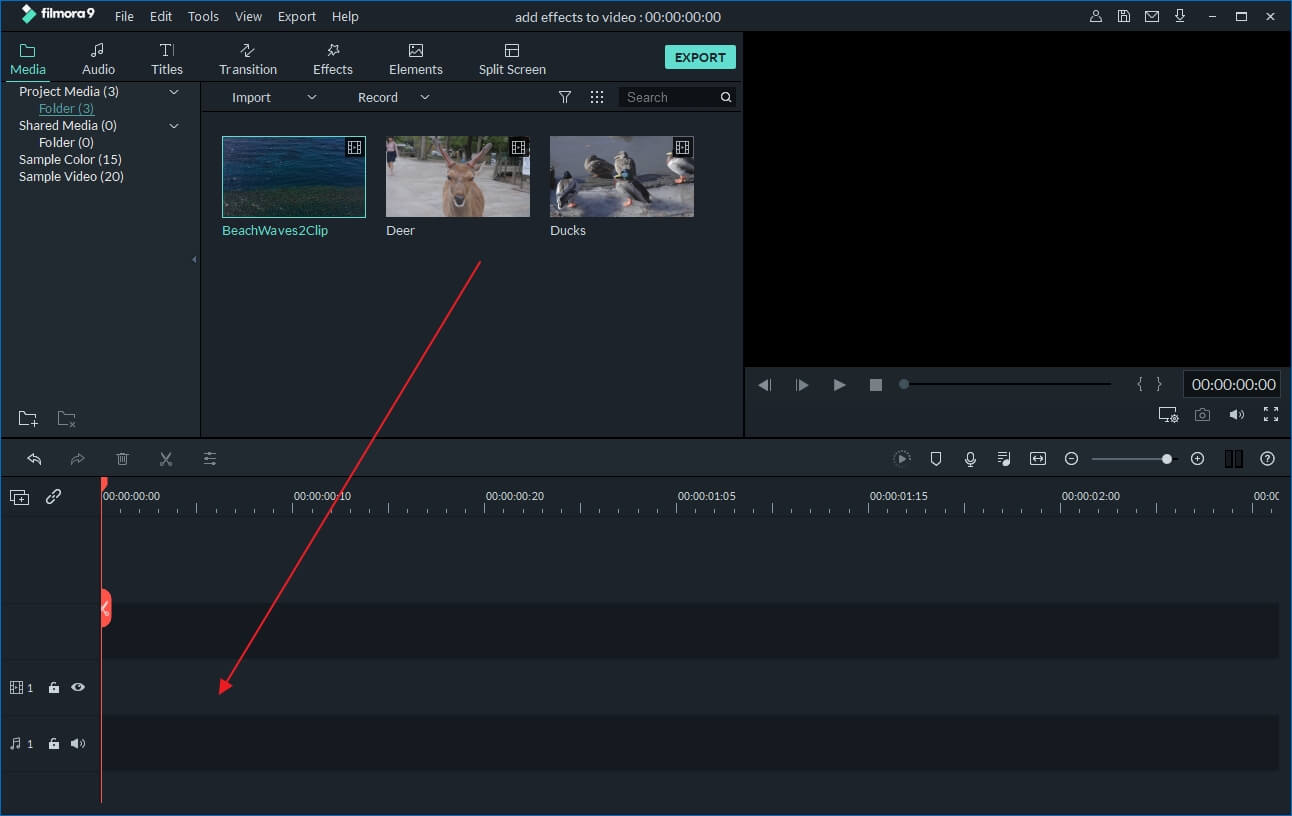
2. Apply audio fade out effect
Drop your video/audio to the Video/Audio Timeline. If you need to detach the audio file from the video, you can use the Detach audio feature in Filmora to accomplish it easily.
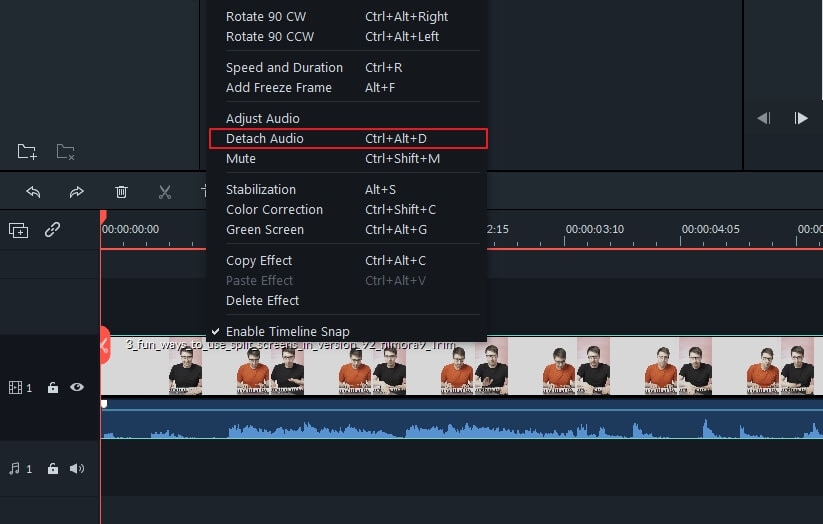
Find the “Fade Out” option from the context menu. Double click on the target file and switch to the “Audio” column. Then drag the slider bar until the audio is faded to your liking. Then you can manually set the fade out the length by dragging the slider bar to the right or left. If you make a mistake or want to change the length, click the “Reset” button. Then click the “Play” button to play the newly faded audio track.
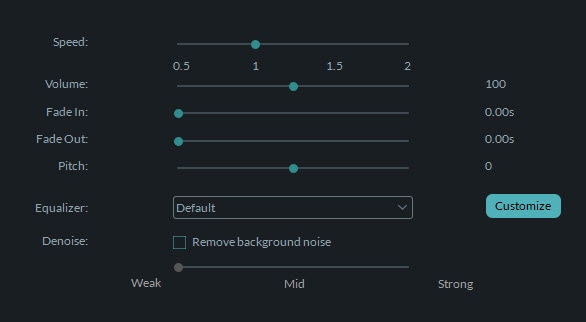
3. Save the newly faded file
You can specify the output format, output name, and output folder. If you want to specify the detailed parameters, click the triangle beside the “Advanced settings” option and make changes by clicking the drop-down list. If you’re satisfied with the result, click the “Export” button, and then an output window will pop up.
If you want to play the new file on mobile devices such as iPhone, iPad, iPod, Zune, go to the “Device” tab and choose a specific device from the list. You can also directly share the file to YouTube and Facebook in the “YouTube” tab or burn it to DVD in the “DVD” tab.
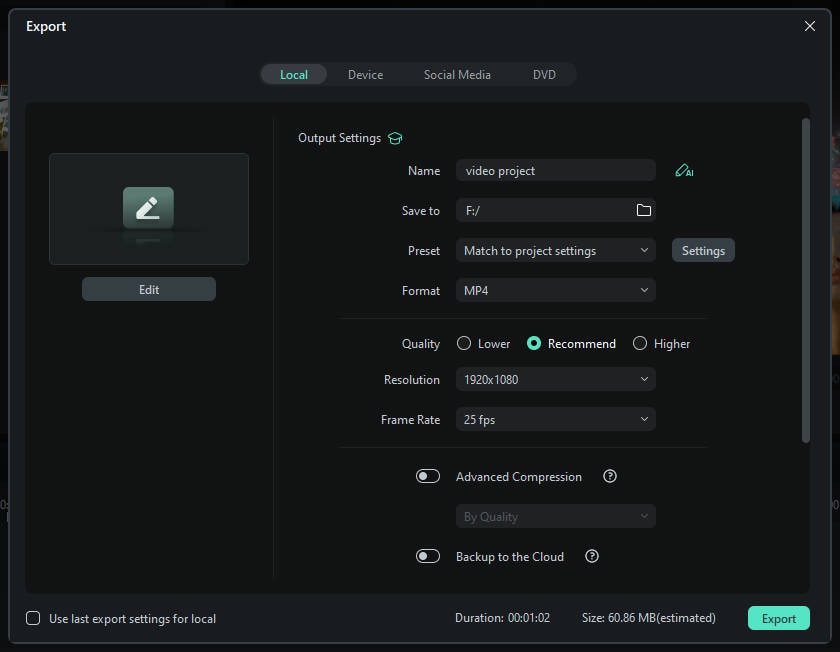
Audio fading out is a simple task with Wondershare Filmora. With this powerful video editing tool, you can also combine video/audio, split video, rotate video, add the image to mp3, remove audio from video, and more. Now download and explore more possibilities for your digital world.
Related Tips: How to Edit the Audio Track of Your Video
Versatile Video Editor - Wondershare Filmora
An easy yet powerful editor
Numerous effects to choose from
Detailed tutorials provided by the official channel
For Win 7 or later (64-bit)
For macOS 10.12 or later
How To Fade Out Audio in Wondershare Filmora?
1. Import your video/audio to Wondershare Filmora
Install and open Wondershare Filmora . Click the “Import” button to browse and import the video/audio file you want to edit. You can also drag and drop your video/audio file to the program. Wondershare Filmora supports various video and audio formats such as AVI, NSV, FLV, MKV, MP4, M4V, RMVB, TS, TP, TRP, M2TS, APE, CUE, AU, AMR, OGG, and more. You can directly import these kinds of files without conversion.

2. Apply audio fade out effect
Drop your video/audio to the Video/Audio Timeline. If you need to detach the audio file from the video, you can use the Detach audio feature in Filmora to accomplish it easily.

Find the “Fade Out” option from the context menu. Double click on the target file and switch to the “Audio” column. Then drag the slider bar until the audio is faded to your liking. Then you can manually set the fade out the length by dragging the slider bar to the right or left. If you make a mistake or want to change the length, click the “Reset” button. Then click the “Play” button to play the newly faded audio track.

3. Save the newly faded file
You can specify the output format, output name, and output folder. If you want to specify the detailed parameters, click the triangle beside the “Advanced settings” option and make changes by clicking the drop-down list. If you’re satisfied with the result, click the “Export” button, and then an output window will pop up.
If you want to play the new file on mobile devices such as iPhone, iPad, iPod, Zune, go to the “Device” tab and choose a specific device from the list. You can also directly share the file to YouTube and Facebook in the “YouTube” tab or burn it to DVD in the “DVD” tab.

Audio fading out is a simple task with Wondershare Filmora. With this powerful video editing tool, you can also combine video/audio, split video, rotate video, add the image to mp3, remove audio from video, and more. Now download and explore more possibilities for your digital world.
Related Tips: How to Edit the Audio Track of Your Video
Versatile Video Editor - Wondershare Filmora
An easy yet powerful editor
Numerous effects to choose from
Detailed tutorials provided by the official channel
For Win 7 or later (64-bit)
For macOS 10.12 or later
How To Fade Out Audio in Wondershare Filmora?
1. Import your video/audio to Wondershare Filmora
Install and open Wondershare Filmora . Click the “Import” button to browse and import the video/audio file you want to edit. You can also drag and drop your video/audio file to the program. Wondershare Filmora supports various video and audio formats such as AVI, NSV, FLV, MKV, MP4, M4V, RMVB, TS, TP, TRP, M2TS, APE, CUE, AU, AMR, OGG, and more. You can directly import these kinds of files without conversion.

2. Apply audio fade out effect
Drop your video/audio to the Video/Audio Timeline. If you need to detach the audio file from the video, you can use the Detach audio feature in Filmora to accomplish it easily.

Find the “Fade Out” option from the context menu. Double click on the target file and switch to the “Audio” column. Then drag the slider bar until the audio is faded to your liking. Then you can manually set the fade out the length by dragging the slider bar to the right or left. If you make a mistake or want to change the length, click the “Reset” button. Then click the “Play” button to play the newly faded audio track.

3. Save the newly faded file
You can specify the output format, output name, and output folder. If you want to specify the detailed parameters, click the triangle beside the “Advanced settings” option and make changes by clicking the drop-down list. If you’re satisfied with the result, click the “Export” button, and then an output window will pop up.
If you want to play the new file on mobile devices such as iPhone, iPad, iPod, Zune, go to the “Device” tab and choose a specific device from the list. You can also directly share the file to YouTube and Facebook in the “YouTube” tab or burn it to DVD in the “DVD” tab.

Audio fading out is a simple task with Wondershare Filmora. With this powerful video editing tool, you can also combine video/audio, split video, rotate video, add the image to mp3, remove audio from video, and more. Now download and explore more possibilities for your digital world.
Related Tips: How to Edit the Audio Track of Your Video
Versatile Video Editor - Wondershare Filmora
An easy yet powerful editor
Numerous effects to choose from
Detailed tutorials provided by the official channel
For Win 7 or later (64-bit)
For macOS 10.12 or later
How To Fade Out Audio in Wondershare Filmora?
1. Import your video/audio to Wondershare Filmora
Install and open Wondershare Filmora . Click the “Import” button to browse and import the video/audio file you want to edit. You can also drag and drop your video/audio file to the program. Wondershare Filmora supports various video and audio formats such as AVI, NSV, FLV, MKV, MP4, M4V, RMVB, TS, TP, TRP, M2TS, APE, CUE, AU, AMR, OGG, and more. You can directly import these kinds of files without conversion.

2. Apply audio fade out effect
Drop your video/audio to the Video/Audio Timeline. If you need to detach the audio file from the video, you can use the Detach audio feature in Filmora to accomplish it easily.

Find the “Fade Out” option from the context menu. Double click on the target file and switch to the “Audio” column. Then drag the slider bar until the audio is faded to your liking. Then you can manually set the fade out the length by dragging the slider bar to the right or left. If you make a mistake or want to change the length, click the “Reset” button. Then click the “Play” button to play the newly faded audio track.

3. Save the newly faded file
You can specify the output format, output name, and output folder. If you want to specify the detailed parameters, click the triangle beside the “Advanced settings” option and make changes by clicking the drop-down list. If you’re satisfied with the result, click the “Export” button, and then an output window will pop up.
If you want to play the new file on mobile devices such as iPhone, iPad, iPod, Zune, go to the “Device” tab and choose a specific device from the list. You can also directly share the file to YouTube and Facebook in the “YouTube” tab or burn it to DVD in the “DVD” tab.

Audio fading out is a simple task with Wondershare Filmora. With this powerful video editing tool, you can also combine video/audio, split video, rotate video, add the image to mp3, remove audio from video, and more. Now download and explore more possibilities for your digital world.
Related Tips: How to Edit the Audio Track of Your Video
Versatile Video Editor - Wondershare Filmora
An easy yet powerful editor
Numerous effects to choose from
Detailed tutorials provided by the official channel
Quick and Easy Vocal Removal in Audacity: A Guide
Removing vocals from audio tracks or songs can be tricky. You may want to create a video and need an instrumental track to add to the background. Maybe you are a content creator looking to remove vocals from a song and extract the instrumental parts for background music in various projects. The Audacity vocal remover makes it easy to achieve this. The vocal remover in Audacity is a great tool that brings satisfactory results without losing the quality of the original track. In this article, we explain two methods of vocal reduction and isolation Audacity and the steps you can follow to do the same in Filmora.
AI Vocal Remover A cross-platform for facilitating your video editing process by offering valuable benefits!
Free Download Free Download Learn More

Method 1: Remove Vocals Using Audacity Vocal Reduction Tool
The first method of removing vocals in Audacity is using the built-in vocal remover. This method is effective in completely removing vocals depending on how much processing is on the vocal. Even if the vocals are not completely removed, the method will reduce the volume significantly to give you great results. Let’s have a look at how to isolate vocal audacity with this method.
Step 1: Open Audacity
The first thing you need to do is open the Audacity software in preparation for the vocal removal.
Step 2: Import the Audio Track
Go to File > Import > Audio to import the audio track you want to edit.
Step 3: Select Audio Track
Select the song or audio track from which you want to remove the vocals. This allows Audacity to load the waveform of the track into the editor.
Step 4: Export as MP3
Backup the file so that you still have the whole song available for use later. Go to File > Export > Export as MP3. Audacity will export the track in the original file format. If it was a WAV audio file, the export will be to that type. This ensures that the audio artifacts are kept in the best condition for editing. Be sure to name the exported file in something you will easily remember.
Step 5: Import the New Audio File
Once you have exported the audio file, click “Close “on the original file. Then import the file you exported in the last step.
Step 6: Apply Vocal Reduction and Isolation
Click on Select, then Select All. On the Effect drop-down menu, select Audacity Vocal Reduction and Isolation.
Step 7: Remove Vocals
Click on the Action tab and select Remove Vocals. Wait for Audacity to remove the vocal and click Play to listen to the edited track. Audacity isolate vocals giving you clear instruments for your audio track or song file.
This method is a quick and easy way to remove vocals from any song in Audacity. It works best with any kind of song and will produce the edited track in just a matter of minutes. On the drawback, this method does not always wholly remove vocal and you may at times still hear bits of it. It may also remove other elements of the audio in addition to the vocal. Nonetheless, it is an effective approach that will work most of the time.
Method 2: Remove Vocals Using Audacity Splitting Audio Channels
When working with songs or audio tracks with vocals in one channel and instruments in another, this is the best method to use. The Audacity vocal remover plugin gives you a simple way to separate the vocals and other sounds in an audio file. However, you cannot tell song that has multiple channels simply by looking at or listening to it. Therefore, you can try this method with any of your files and see the quality of the outcome. Here are the steps for this audacity separate vocals method:
Step 1: Import Your File
Start by importing your audio track or song file into Audacity.
Step 2: Split Stereo to Mono
In the title of the audio, click the Down Arrow. Then select Split Stereo to Mono.
Step 3: Play Solo
Click on the Play button and choose Solo on each track. This allows you to see if there is any isolated vocal on either channel.
Step 4: Delete Isolated Vocal
From the results, delete the section that contains the isolated vocal from the Audacity session.
This alternative method is also effective in extract vocals Audacity. The main benefit is it has fewer steps than the first method. It will also completely remove vocals that are on their own channel. However, the method is limited in that it does not work for the vast majority of audio. It will only work for audio tracks with vols on one channel and instruments on another.
Alternative Way to Remove Vocals from Audio with Filmora
Another great option for removing vocals from a song is using Wondershare Filmora. The video editing software comes with some interesting features, including vocal removal. The recently released Filmora Version 13 is more versatile and user-friendly for better edits. With the integration of AI, users can automate vocal removal which would normally require a lot of time and incredible skill to execute. The AI in the software does this in a few minutes. Filmora also has some amazing features that automate video editing, allowing you to do more with less effort.
Free Download For Win 7 or later(64-bit)
Free Download For macOS 10.14 or later
Quick Tutorial on Removing Vocals with Filmora
The AI Vocal Remover feature on Filmora separates vocals and music from any song or audio track. You can use this feature to extract any acapella from music tracks or dub videos freely by removing the vocals completely. The feature allows you to keep high-quality audio while removing the vocals. It uses advanced algorithms to isolate vocals while maintaining exceptional audio quality. This ensures that vocals are effectively separated from the background music, by audio fidelity is not lost. To remove vocals from your video or audio files, follow these simple steps:
Method 1: Filmora Top Toolbar
Step 1 – Launch Filmors and Create a New Projects
Click on the Filmora icon on your desktop to launch the software. Log in to sign up using the Profile icon at the top. Navigate to the control panel on the left side, and then choose the Create Project Option, and click New Project.
Step 2: Import Source Files and Add to Timeline
On the Main Filmora Interface, select Media from the custom toolbar. Then click Files and import the files you want to use to Filmora. Select the imported files, and drag and drop them into the timeline panel.
Step 3 – Enable AI Vocal Removal
Select the audio track or music clip you want to use in the timeline. Navigate toward the Tools tab at the top toolbar. Choose the Audio option from the drop-down menu and click on the AI Vocal Remover.
Method 2: Running AI Vocal Remover from the Timeline
Once you upload media Filmora, select the media that you want to remove vocal from. Then drag and drop it to the timeline panel. Right-click on the video and choose the AI Vocal Remover from the options panel. This will automatically remove vocals from the video.
Compared to Audacity, Filmora’s AI Vocal Remover tool is quick and easy to use. It will facilitate your video editing process by allowing you to remove vocals and use instrumentals on the go. For instance, this feature allows you to easily dub any video without having to cover up the current vocals. This means that your videos will be more entertaining and engaging while keeping great soundtracks. Match the energy in your videos with the quality of the instrumentals with just a few clicks.
Conclusion
Removing vocals from a video song or audio file gives you more freedom in your projects. You can use the audio as an instrumental or in other creative ways. Audacity is among the most popular vocal removers on the internet. It offers several ways to remove vocals clearly from your audio tracks or music files. Vocal isolation audacity is easy and takes only a few steps. However, we recommend the AI vocal remover feature by Filmora because it is more versatile and accurate. The automated feature takes care of everything for you when removing the vocals from your audio files. You also get to utilize other useful video editing features that automate mundane tasks.
Free Download Free Download Learn More

Method 1: Remove Vocals Using Audacity Vocal Reduction Tool
The first method of removing vocals in Audacity is using the built-in vocal remover. This method is effective in completely removing vocals depending on how much processing is on the vocal. Even if the vocals are not completely removed, the method will reduce the volume significantly to give you great results. Let’s have a look at how to isolate vocal audacity with this method.
Step 1: Open Audacity
The first thing you need to do is open the Audacity software in preparation for the vocal removal.
Step 2: Import the Audio Track
Go to File > Import > Audio to import the audio track you want to edit.
Step 3: Select Audio Track
Select the song or audio track from which you want to remove the vocals. This allows Audacity to load the waveform of the track into the editor.
Step 4: Export as MP3
Backup the file so that you still have the whole song available for use later. Go to File > Export > Export as MP3. Audacity will export the track in the original file format. If it was a WAV audio file, the export will be to that type. This ensures that the audio artifacts are kept in the best condition for editing. Be sure to name the exported file in something you will easily remember.
Step 5: Import the New Audio File
Once you have exported the audio file, click “Close “on the original file. Then import the file you exported in the last step.
Step 6: Apply Vocal Reduction and Isolation
Click on Select, then Select All. On the Effect drop-down menu, select Audacity Vocal Reduction and Isolation.
Step 7: Remove Vocals
Click on the Action tab and select Remove Vocals. Wait for Audacity to remove the vocal and click Play to listen to the edited track. Audacity isolate vocals giving you clear instruments for your audio track or song file.
This method is a quick and easy way to remove vocals from any song in Audacity. It works best with any kind of song and will produce the edited track in just a matter of minutes. On the drawback, this method does not always wholly remove vocal and you may at times still hear bits of it. It may also remove other elements of the audio in addition to the vocal. Nonetheless, it is an effective approach that will work most of the time.
Method 2: Remove Vocals Using Audacity Splitting Audio Channels
When working with songs or audio tracks with vocals in one channel and instruments in another, this is the best method to use. The Audacity vocal remover plugin gives you a simple way to separate the vocals and other sounds in an audio file. However, you cannot tell song that has multiple channels simply by looking at or listening to it. Therefore, you can try this method with any of your files and see the quality of the outcome. Here are the steps for this audacity separate vocals method:
Step 1: Import Your File
Start by importing your audio track or song file into Audacity.
Step 2: Split Stereo to Mono
In the title of the audio, click the Down Arrow. Then select Split Stereo to Mono.
Step 3: Play Solo
Click on the Play button and choose Solo on each track. This allows you to see if there is any isolated vocal on either channel.
Step 4: Delete Isolated Vocal
From the results, delete the section that contains the isolated vocal from the Audacity session.
This alternative method is also effective in extract vocals Audacity. The main benefit is it has fewer steps than the first method. It will also completely remove vocals that are on their own channel. However, the method is limited in that it does not work for the vast majority of audio. It will only work for audio tracks with vols on one channel and instruments on another.
Alternative Way to Remove Vocals from Audio with Filmora
Another great option for removing vocals from a song is using Wondershare Filmora. The video editing software comes with some interesting features, including vocal removal. The recently released Filmora Version 13 is more versatile and user-friendly for better edits. With the integration of AI, users can automate vocal removal which would normally require a lot of time and incredible skill to execute. The AI in the software does this in a few minutes. Filmora also has some amazing features that automate video editing, allowing you to do more with less effort.
Free Download For Win 7 or later(64-bit)
Free Download For macOS 10.14 or later
Quick Tutorial on Removing Vocals with Filmora
The AI Vocal Remover feature on Filmora separates vocals and music from any song or audio track. You can use this feature to extract any acapella from music tracks or dub videos freely by removing the vocals completely. The feature allows you to keep high-quality audio while removing the vocals. It uses advanced algorithms to isolate vocals while maintaining exceptional audio quality. This ensures that vocals are effectively separated from the background music, by audio fidelity is not lost. To remove vocals from your video or audio files, follow these simple steps:
Method 1: Filmora Top Toolbar
Step 1 – Launch Filmors and Create a New Projects
Click on the Filmora icon on your desktop to launch the software. Log in to sign up using the Profile icon at the top. Navigate to the control panel on the left side, and then choose the Create Project Option, and click New Project.
Step 2: Import Source Files and Add to Timeline
On the Main Filmora Interface, select Media from the custom toolbar. Then click Files and import the files you want to use to Filmora. Select the imported files, and drag and drop them into the timeline panel.
Step 3 – Enable AI Vocal Removal
Select the audio track or music clip you want to use in the timeline. Navigate toward the Tools tab at the top toolbar. Choose the Audio option from the drop-down menu and click on the AI Vocal Remover.
Method 2: Running AI Vocal Remover from the Timeline
Once you upload media Filmora, select the media that you want to remove vocal from. Then drag and drop it to the timeline panel. Right-click on the video and choose the AI Vocal Remover from the options panel. This will automatically remove vocals from the video.
Compared to Audacity, Filmora’s AI Vocal Remover tool is quick and easy to use. It will facilitate your video editing process by allowing you to remove vocals and use instrumentals on the go. For instance, this feature allows you to easily dub any video without having to cover up the current vocals. This means that your videos will be more entertaining and engaging while keeping great soundtracks. Match the energy in your videos with the quality of the instrumentals with just a few clicks.
Conclusion
Removing vocals from a video song or audio file gives you more freedom in your projects. You can use the audio as an instrumental or in other creative ways. Audacity is among the most popular vocal removers on the internet. It offers several ways to remove vocals clearly from your audio tracks or music files. Vocal isolation audacity is easy and takes only a few steps. However, we recommend the AI vocal remover feature by Filmora because it is more versatile and accurate. The automated feature takes care of everything for you when removing the vocals from your audio files. You also get to utilize other useful video editing features that automate mundane tasks.
Also read:
- [New] Inside Outlook Unveiling VR's Downfalls
- [New] The Complete Guide to Setting Up Streamlabs OBS for 2024
- [Updated] The Rotation Ritual Youtube Video Techniques for Visual Impact for 2024
- 2024 Approved SRT to Subtitles (SUBC) Practical Steps for Conversion
- Capture & Share Perfection: Top Picks for Ultimate Screen Capture Tools
- In 2024, How To Enable USB Debugging on a Locked Oppo Reno 8T 5G Phone
- New 5 Best Cellphone Tunes of the Year
- New In 2024, How to Generate a Noise-Free AVI Version for Presentation Purposes
- Pixels of Reality Navigating the World of Instagram Authenticity for 2024
- The Futures Frontiers Unveiling the Best 5 Audio Video Fusion Technologies
- Top 10 Best Spy Watches For your Apple iPhone 15 Plus | Dr.fone
- Top Digital Depositories Customized Alert Sounds for 2024
- Updated 2024 Approved Masterful Audio Blenders Perfecting the Art of Online Content Delivery
- Updated In 2024, Audio Extractor How to Extract Audio From Video
- Updated In 2024, Sneak Peek Into the Secret of Silent Videos in Windows 10 (No Additional Software)
- Title: 2024 Approved The Ultimate Step-by-Step on Incorporating Sound Into Videos Using Magix
- Author: Paul
- Created at : 2024-10-12 22:20:39
- Updated at : 2024-10-18 06:09:33
- Link: https://voice-adjusting.techidaily.com/2024-approved-the-ultimate-step-by-step-on-incorporating-sound-into-videos-using-magix/
- License: This work is licensed under CC BY-NC-SA 4.0.

